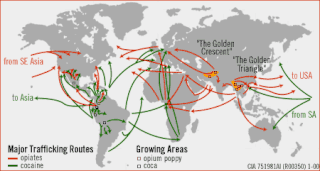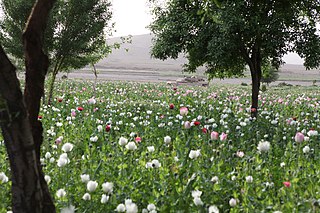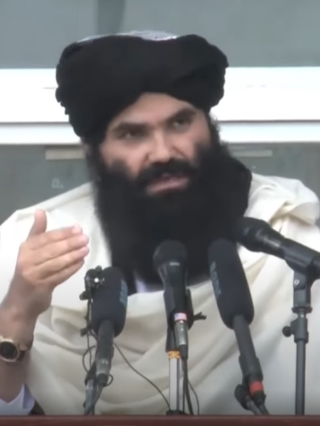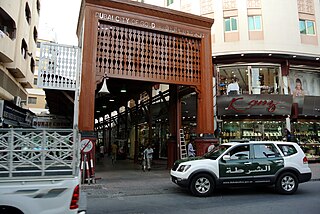Related Research Articles
Bashir Noorzai is a convicted former Afghan drug lord. He was an early supporter of the Taliban movement and later worked as an undercover agent on behalf of the U.S. government. Despite being among America's most wanted drug traffickers, he agreed to come to New York City for a debriefing after being promised by his handlers that he would not be arrested. He was arrested ten days after his arrival. In the aftermath of Afghanistan take over by the Taliban, the group demanded that the US release him in exchange with an American engineer, Mark Frerichs, who was kidnapped by the group in January 2020.

The illegal drug trade or drug trafficking is a global black market dedicated to the cultivation, manufacture, distribution and sale of prohibited drugs. Most jurisdictions prohibit trade, except under license, of many types of drugs through the use of drug prohibition laws. The think tank Global Financial Integrity's Transnational Crime and the Developing World report estimates the size of the global illicit drug market between US$426 and US$652 billion in 2014 alone. With a world GDP of US$78 trillion in the same year, the illegal drug trade may be estimated as nearly 1% of total global trade. Consumption of illegal drugs is widespread globally and it remains very difficult for local authorities to thwart its popularity.
Narcoterrorism, in its original context, is understood to refer to the attempts of narcotics traffickers to influence the policies of a government or a society through violence and intimidation, and to hinder the enforcement of anti-drug laws by the systematic threat or use of such violence. As with most definitions of terrorism, it typically only refers to non-state actors.

The United Nations Office on Drugs and Crime is a United Nations office that was established in 1997 as the Office for Drug Control and Crime Prevention by combining the United Nations International Drug Control Program (UNDCP) and the Crime Prevention and Criminal Justice Division in the United Nations Office at Vienna, adopting the current name in 2002.

The United Nations Convention Against Transnational Organized Crime is a 2000 United Nations-sponsored multilateral treaty against transnational organized crime.

The Golden Crescent is the name given to one of Asia's two principal areas of illicit opium production. Located at the crossroads of Central, South, and Western Asia, this space covers the mountainous peripheries of Afghanistan and Pakistan, extending into eastern Iran.

The Golden Triangle is the area where the borders of Thailand, Laos, and Myanmar meet at the confluence of the Ruak and Mekong rivers. The name "Golden Triangle"—coined by the CIA—is commonly used more broadly to refer to an area of approximately 950,000 square kilometres (367,000 sq mi) that overlaps the mountains of the three adjacent countries.

Afghanistan has long had a history of opium poppy cultivation and harvest. As of 2021, Afghanistan's harvest produces more than 90% of illicit heroin globally, and more than 95% of the European supply. More land is used for opium in Afghanistan than is used for coca cultivation in Latin America. The country has been the world's leading illicit drug producer since 2001. In 2007, 93% of the non-pharmaceutical-grade opiates on the world market originated in Afghanistan. By 2019 Afghanistan still produced about 84% of the world market. This amounts to an export value of about US$4 billion, with a quarter being earned by opium farmers and the rest going to district officials, insurgents, warlords, and drug traffickers. In the seven years (1994–2000) prior to a Taliban opium ban, the Afghan farmers' share of gross income from opium was divided among 200,000 families. As of 2017, opium production provides about 400,000 jobs in Afghanistan, more than the Afghan National Security Forces. In addition to opium, Afghanistan is also the world's leading producer of hashish.

Transnational organized crime (TOC) is organized crime coordinated across national borders, involving groups or markets of individuals working in more than one country to plan and execute illegal business ventures. In order to achieve their goals, these criminal groups use systematic violence and corruption. Common transnational organized crimes include conveying drugs, conveying arms, trafficking for sex, toxic waste disposal, materials theft and poaching.

Sirajuddin Haqqani is an Afghan warlord who is the first deputy leader of Afghanistan and the acting interior minister. He has been a deputy leader of the Taliban since 2015, and was additionally appointed to his ministerial role after the Taliban's victory over Western-backed forces in the 2001–2021 war. He has led the Haqqani network, a semi-autonomous paramilitary arm of the Taliban, since inheriting it from his father in 2018, and has primarily had military responsibilities within the Taliban.
This article deals with activities of the U.S. Central Intelligence Agency related to transnational crime, including the illicit drug trade.

Crime in Afghanistan is present in various forms, and includes the following: corruption, contract killings or assassinations, bombings, kidnapping, drug trafficking, money laundering, black marketeering, and ordinary crimes such as theft and assault.

The crime rate in the United Arab Emirates is relatively low compared to more highly industrialized nations. Incidents of petty crime such as pickpocketing are low. The United States Department of State states: "Crime generally is not a problem for travelers in the UAE. However, the U.S. Embassy advises U.S. citizens to take normal precautions against theft, such as not leaving a wallet, purse, or credit card unattended. Although vehicle break-ins in the UAE are rare, U.S. citizens are encouraged to ensure that unattended vehicles are locked and that valuables are not left out in plain sight".
The Haqqani network is an Afghan Islamist group, built around the family of the same name, that has used asymmetric warfare in Afghanistan to fight against Soviet forces in the 1980s, and US-led NATO forces and the Islamic Republic of Afghanistan government in the 21st century. It is considered to be a "semi-autonomous" offshoot of the Taliban. It has been most active in eastern Afghanistan and across the border in north-west Pakistan.
Louise Isobel Shelley is a University professor and Omer L. and Nancy Hirst Endowed Chair at the Schar School of Policy and International Affairs at George Mason University in Virginia. She is also founder and executive director of the Terrorism, Transnational Crime and Corruption Center (TraCCC).

The Inter-Services Intelligence (ISI) intelligence agency of Pakistan has been accused of being heavily involved in covertly running military intelligence programs in Afghanistan since before the Soviet invasion of Afghanistan in 1979. The first ISI operation in Afghanistan took place in 1975. It was in "retaliation to Republic of Afghanistan's proxy war and support to the militants against Pakistan". Before 1975, ISI did not conduct any operation in Afghanistan and it was only after decade of Republic of Afghanistan's proxy war against Pakistan, support to militants and armed incursion in 1960 and 1961 in Bajaur that Pakistan was forced to retaliate. Later on, in the 1980s, the ISI in Operation Cyclone systematically coordinated the distribution of arms and financial means provided by the United States Central Intelligence Agency (CIA) to factions of the Afghan mujahideen such as the Hezb-e Islami (HeI) of Gulbuddin Hekmatyar and the forces of Ahmad Shah Massoud whose forces would later be known as the Northern Alliance. After the Soviet retreat, the different Mujahideen factions turned on each other and were unable to come to a power sharing deal which resulted in a civil war. The United States, along with the ISI and the Pakistani government of Prime Minister Benazir Bhutto became the primary source of support for Hekmatyar in his 1992–1994 bombardment campaign against the Islamic State of Afghanistan and the capital Kabul.
Haji Bagcho Sherzai, also known as Haji Bagh Chagul or Haji Bagcho, is a convicted drug trafficker from Afghanistan. He is accused by the United States for having ties with the Taliban. He was convicted on March 13, 2012, by a jury in U.S. District Court for the District of Columbia of conspiracy, distribution of heroin for importation into the United States and narco-terrorism.
The Secretariat for Multidimensional Security of the Organization of American States is a part of the General Secretariat, which is headquartered in Washington, D.C., United States. The Secretariat for Multidimensional Security has a mandate to promote cooperation between Organization's Member States, Inter-American and international organizations, as well as with entities such as the United Nations and its subsidiaries, in order to analyze, prevent, confront and respond to security threats.
In the late 1950s and early 1960s, the drug trade in West Africa rapidly expanded amid dramatic increases in US and European demand for cocaine, cannabis, and other drugs. This resulted in the expansion of two distinct trade routes, both of which went through West Africa. One route exported domestically produced cannabis from West Africa to South Africa, Europe, and Asia. The other trade route moved cocaine from Latin America and heroin from Afghanistan and Southeast Asia to Europe and the United States. In both of these routes, drug traffickers took advantage of trading networks created by Malian and Berber traders in colonial times to move drugs through the region, as well as West Africa's broader geographical location as an intermediate stop from Latin America and Southwest Asia to Europe and the United States. This was due in part to West Africa's badly policed borders, endemic corruption, and economic inequalities.
East African drug trade refers to the sale and trafficking of illegal drugs that take place in East African countries like Kenya, Tanzania, Uganda, Somalia, and Ethiopia. The most prevalent types of drugs traded in East Africa are heroin, marijuana, cocaine, methamphetamine, and khat, all of which are strictly prohibited in East African countries.
References
- ↑ "What to do?". The Economist. Retrieved 2018-04-06.
- ↑ Ghosh, Bobby (2009-07-17). "Fighting the New Narcoterrorism Syndicates". Time. ISSN 0040-781X . Retrieved 2018-04-06.
- ↑ "Gretchen Peters". UK. Retrieved 2018-02-13.
- ↑ Denver, University of. "Sié Fellows Alumni | University of Denver". www.du.edu. Retrieved 2018-02-13.
- ↑ Soksreinith, Ten. "Cambodia Daily Alumni Hope Cambodians Continue Free Press Tradition". VOA. Retrieved 2018-02-13.
- ↑ "Heroin, The Taliban And The 'Seeds Of Terror'". NPR.org. Retrieved 2018-04-06.
- ↑ "NOMINEES FOR THE 29th ANNUAL NEWS & DOCUMENTARY EMMY® AWARDS ANNOUNCED BY THE NATIONAL ACADEMY OF TELEVISION ARTS & SCIENCES | The Emmy Awards - The National Academy of Television Arts & Sciences". emmyonline.com. Retrieved 2018-04-06.
- ↑ "What to do?". The Economist. Retrieved 2018-02-13.
- ↑ "Protecting Rhinos by Targeting Poachers | George Mason". www2.gmu.edu. Retrieved 2018-04-09.
- ↑ "Chair's update: Task Force on Charting Illicit Trade" (PDF). www.OECD.org. November 2013. Retrieved 9 April 2018.
- ↑ McConnell, Tristan (2017-08-19). "'They're like the mafia': the super gangs behind Africa's poaching crisis". the Guardian. Retrieved 2018-02-13.
- ↑ Howell, Roy. "Analyzing the Links between Transnational Organized Crime & Ivory Trafficking". www.internationalconservation.org. Retrieved 2018-02-13.
- ↑ Swain, The Sunday Times review by Jon (2009-09-27). "Seeds of Terror: How Heroin Is Bankrolling the Taliban and Al Qaeda by Gretchen Peters". The Sunday Times. ISSN 0956-1382 . Retrieved 2018-04-06.
- ↑ "Gretchen Peters". NPR.org. Retrieved 2018-02-13.
- ↑ "Taliban: Holy Warriors Or "The Sopranos"?" . Retrieved 2018-02-13.
- ↑ "Gretchen Peters - The Daily Show with Jon Stewart | Comedy Central". Comedy Central. 9 June 2009. Retrieved 2018-02-13.
- ↑ "Crime and Insurgency – Combating Terrorism Center at West Point". Combating Terrorism Center at West Point. 2010-10-14. Retrieved 2018-02-13.
- ↑ Peters, Gretchen (September 2017). "The Curse of the Shiny Object, How Humans Fight Problems Where They Are Visible, and Why We Need to See Beyond" (PDF). Prism. 7 (1): 75. Retrieved 9 April 2018.
- ↑ Peters, Gretchen (July 2012). "Haqqani Network Financing:The Evolution of an Industry" (PDF). Harmony Project: 77. Retrieved 9 April 2018.
- ↑ Peters, Gretchen; Juan, Zarate. "How financial power can be used to save iconic species from extinction". Business Insider. Retrieved 9 April 2018.
- ↑ Peters, Gretchen (October 15, 2010). "Crime and Insurgency" (PDF). Harmony Project: 107. Retrieved 9 April 2018.
- ↑ Peters, Gretchen (July 1, 2009). "Incorporating Law Enforcement Interrogation Techniques on the Battlefield" (PDF). CTC Sentinel. 2 (4). Retrieved 9 April 2018.
- ↑ Peters, Gretchen (2016). Traffickers and Truckers: Illicit Afghan and Pakistani Power Structures with a Shadowy but Influential Role (PDF). Fort Lesley J. McNair: Center for Complex Operations. p. 125. ISBN 978-0-9861865-7-8 . Retrieved 9 April 2018.